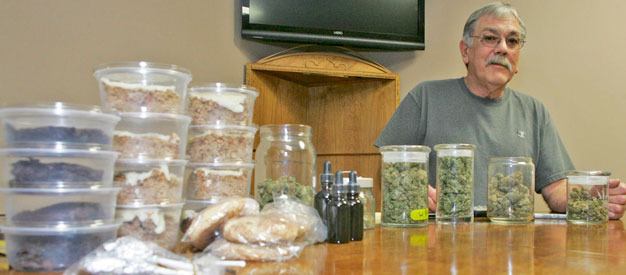A letter from the federal Drug Enforcement Administration threatening to shut down a Kent medical marijuana store because it’s too near a school persuaded owner Charles Lambert to close the business.
Evergreen Association of Collective Gardens closed its store along Central Avenue North in late August, just a few days after Lambert received one of the DEA letters sent Aug. 23 to nearly two dozen marijuana storefronts in Western Washington near schools or other prohibited areas.
The letters informed the owner/operators that such enterprises operating as “dispensaries” within 1,000 feet of a school, playground or other prohibited area could result in the seizure and forfeiture of assets, as well as criminal prosecution, according to a Department of Justice media release.
Evergreen, the subject of a controversial Kent City Council vote in June to ban medical marijuana dispensaries, sat within 1,000 feet of Mill Creek Middle School.
“They have the power to shut it down because it’s still against federal law,” Lambert said in a phone interview about the DEA. “They can come in and shut us down anytime because we were within 1,000 feet of a school.”
Lambert said he has referred his medical marijuana patients to collective gardens that remain open.
Evergreen, which opened in 2011, continued to operate earlier this summer even after the City Council voted 4-3 on June 5 to ban medical marijuana collective gardens because it believes the businesses violate federal law that lists marijuana as an illegal drug under the federal Controlled Substances Act. That ordinance took effect June 13.
The council hotly debated the controversial issue because state law allows the use of medical marijuana.
Deputy City Attorney Pat Fitzpatrick welcomed the news that Evergreen had closed.
“It would have been the city’s desire that from the outset, Mr. Lambert and Evergreen simply comply with federal, state, and city laws that prohibit his type of business,” Fitzpatrick said in an email. “The city requested Mr. Lambert close his business on numerous occasions. The fact that the warning from the federal government has accomplished the desired result is welcomed by the city.”
Kent still has one operating medical marijuana business that city officials are aware of, Herbal Choice Caregivers in North Kent. That business closed temporarily after the city ban, but reopened earlier this summer. The city has sent a letter to the business to ask it to close.
Deryck and Columba Tsang operate Herbal Choice Caregivers, Fitzpatrick said. Deryck Tsang also is one of the plaintiffs who has filed a lawsuit against the city challenging the city’s prohibition on medical marijuana collective gardens.
City prosecutors charged Tsang and Lambert last year with misdemeanor crimes of possession of marijuana and drug paraphernalia, criminal attempt – possession with intent to deliver marijuana and criminal attempt – delivery of marijuana and conspiracy.
“Those cases are pending and scheduled for trial beginning Nov. 2,” Fitzpatrick said.
Douglas Hiatt, an attorney who represented Evergreen and is the campaign chair of Sensible Washington, which supports legalizing marijuana, said the federal government is pushing hard to shut down medical marijuana stores.
“It’s quite clear at this point it’s an administration policy,” said Hiatt during a phone interview. “It’s identical to what’s happened in California. It’s a page right out of the federal playbook. There’s no fighting this when the federal government is enforcing its policy.”
Jenny A. Durkan, U.S. Attorney for the Western District of Washington, released this statement:
“We all work hard to create a safe zone for kids in school,” Durkan said. “There is a reason that both federal and state laws prohibit sales of marijuana in school zones. We need to enforce one message for our students: drugs have no place in or near our schools.”
Washington voters approved medical marijuana use, which has caused confusion about the legality of medical marijuana dispensaries across the state. Federal law still prohibits the use and sale of marijuana, even if for medical purposes.
Federal law, which prohibits the distribution, possession or manufacture of controlled substances, provides enhanced penalties when such activities occur near an educational facility or playground, according to the DEA. Furthermore, federal law makes it illegal to knowingly and intentionally rent or lease property for the purpose of unlawfully distributing, possessing or manufacturing a controlled substance, and provides that real property used in such a manner can be forfeited to the United States.
Talk to us
Please share your story tips by emailing editor@kentreporter.com.
To share your opinion for publication, submit a letter through our website https://www.kentreporter.com/submit-letter/. Include your name, address and daytime phone number. (We’ll only publish your name and hometown.) Please keep letters to 300 words or less.

